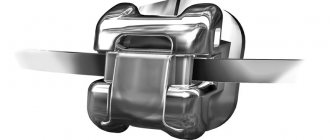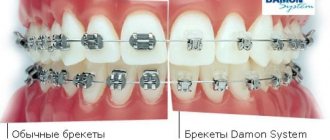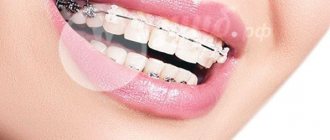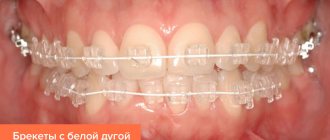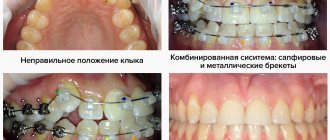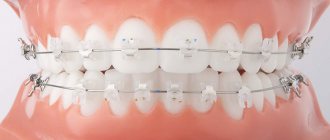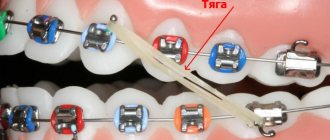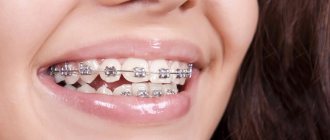Home | Installation of white braces
The most effective method of correcting malocclusion today is the use of various models of braces. However, there are certain difficulties in solving orthodontic problems. They are due to the insufficiently aesthetic appearance of classic braces, which are metal systems and arches attached to the outer surface of the teeth.
To improve the external properties of braces, lingual models have been developed that are attached to the inner surface of the teeth, as well as various types of aesthetic brace systems. In this case, by replacing metal parts with alternative materials, it is possible to make the correction process less noticeable to others. One of the options for improving the aesthetic properties of fixed models is white braces.
White wire braces: myths and facts
Many dental fields are surrounded by myths and misconceptions, and white braces are no exception. So, there is a myth that the arc is cast from light-colored metal. In fact, alloys of nickel, steel, titanium, etc. are used for this, and the light shade is obtained through the use of Teflon. It is quite resistant to external influences, although it can peel off due to such irritants. Another thing is that the frequency of changing arches, which is from 1 to 3 months, will not allow Teflon to lose its qualities, of course, provided that proper care of the system and oral hygiene is taken care of.
White braces cannot be called completely invisible; they will still stand out against the background of the dentition, but they are much less noticeable than metal ones. It is worth saying that a certain percentage of patients, on the contrary, consider it stylish and are happy to give preference to metal structures.
Video on the topic
There are a wide variety of types of braces. What can I say - see for yourself:
Braces are the most effective system for correcting malocclusion at different ages and any abnormalities in the development of teeth in the jaw. To ensure that the correction process does not cause discomfort from an aesthetic point of view, there are so-called white braces.
This is a system with plates and an arch, which is selected according to the color as close as possible to the color of the patient’s tooth enamel. Thus, the correction process (which can take 1.5 - 2 years) will not make the patient feel awkward and embarrassed when talking or smiling.
White arches, clasps and elastic bands
For most people, braces are associated only with bulky, monstrous structures, and many are not even aware of the existence of white braces. They can be made of plastic, sapphire or ceramic, and their main difference will be aesthetics, that is, they are practically invisible in the mouth and do not cause any psychological discomfort to the patient.
White braces do not have a specific name; they are usually called simply white arches, since they become the main component of the entire structure. Its elastic bands and clasps are also usually white, therefore, in addition to the traditional task of straightening teeth, using this system you can also hide the fact of wearing braces from prying eyes.
Initially, they were made of plastic and differ favorably from metal structures precisely because of their aesthetics, but the downside was their fragility and low strength. Over time, the paint on the system wore off, chips appeared and the color changed, so ceramic and sapphire designs also began to appear, replacing plastic ones.
Most popular models
Dentists from leading international orthodontic centers and specialists from the “Smile” clinic network recommend the following models of ceramic brace systems:
- Advanced - produced by an international concern under the 3M Unitek brand. This is a ligature system, characterized by the miniature size of the bracket plates and ideal fit to the enamel surface;
- self-ligating Damon Clear - manufactured by the American company Ormco, they have improved aesthetics, the arc is coated with white coating, and they have an easy-to-open locking mechanism.
Disadvantages of white braces
As for the shortcomings, there are also them, which is quite natural; speaking specifically, these should include:
- an attractive appearance is possible only on white teeth;
- longer period of adaptation of the patient to the system due to its size;
- in comparison with metal structures, they are less reliable in terms of strength;
- they are more demanding to care for in terms of their fragility.
One of the most significant arguments “against” white systems is their price; for a considerable number of patients this aspect is of decisive importance.
What types of white braces are there?
Today, plastic structures are not found very often, giving way to ceramics and sapphires. Ceramic systems are found in two versions: monocrystalline and polycrystalline. The former have a matte tint, while the latter almost completely merge with the teeth due to their transparency. With their help, you can set and successfully solve the problem of correcting the bite, as well as get rid of the patient’s psychological problems.
Ceramic products - the golden mean
Another good thing about ceramics is that you can eat your favorite food almost without exception, and also not have to worry about poor diction. The disadvantage will be the need for careful maintenance, but this is perhaps the only serious disadvantage of such structures.
Often ceramic systems are produced with a white arc. They adhere well to the enamel, are transparent and almost invisible, but the price for them starts at about 50 thousand rubles.
You can find out more about ceramic braces here.
Sapphire designs - elite option
Sapphire systems are made from artificial crystals specially grown for this purpose. They are distinguished by a high level of strength, look very beautiful and are almost invisible to others, but are significantly more expensive than ceramic systems.
Note: It is best to place white braces on the upper row of teeth, since they are more noticeable when talking and smiling. To achieve an even higher level of aesthetics, many dentists recommend installing systems with wings that will protect the structure from food particles getting into it.
The duration of treatment with sapphire systems is about two years; in other respects there are no differences from ceramics, but this does not concern the cost. The difference between sapphires and ceramics is approximately twofold; the price for such designs can reach 100 thousand.
Full information about sapphire white braces can be found here.
Plastic systems - a budget solution
There are no external differences between plastic braces and ceramic or sapphire analogues; it is easy to choose the color to match the desired shade; in addition, you can further improve aesthetic indicators with the help of a white arch. Finally, the financial aspect plays a decisive role, since this is the cheapest option of all those discussed above, but there are also disadvantages that push many people to choose sapphire or ceramic designs:
- not the highest strength, which, of course, can be strengthened with additional materials, but this will immediately lead to an increase in the cost of the system;
- poor color fastness, which means avoiding some products, especially those containing dyes;
- longer duration of treatment due to slow movement of teeth in a row.
You can find out more about plastic white systems in this article.
Sapphire designs - elite option
In aesthetic terms, sapphire braces are practically the best and at the same time the most expensive. In cases where I use a white arc to attach them, they are simply impossible to notice at a short distance.
They are made from specially made colorless crystals. The crystal itself is quite beautiful, due to this, these braces can be called a decoration rather than an orthodontic system.
The duration of treatment, taking into account the severity of the malocclusion, is approximately 2 years. Otherwise, sapphire products are completely identical to ceramics, but they are even more expensive - in different clinics it varies, from 80 to 100 thousand rubles.
Differences between white arcs and metal ones
The arch is the part of the orthodontic structure that receives the closest attention. This state of affairs is explained by the fact that its role in correcting the bite cannot be overestimated; in particular, it is the arch that creates the necessary pressure, due to which the teeth move in the desired direction.
From the point of view of its characteristics, a white arc is no different from a metal one; the main role here is played by external differences. In fact, it is also made of metal, but covered on top with enamel with a special composition, thanks to which it is not so striking to others. Color does not have any effect on the effectiveness of the treatment process.
Features of wearing and care of the system
White braces can be an excellent solution for those who may have psychological discomfort from wearing such braces. For example, many children experience stress from ordinary metal structures because they are teased by their peers, and to make it easier to endure this period, it makes sense to consider installing just such a structure.
Some patients complain that the white color changes to yellow over time, blaming the imperfection of the design and their dentist for this. However, the fact is that such a picture arises in situations where patients do not take good care of their oral hygiene and skip visits to the doctor for correction. Accordingly, a proper attitude to these issues will allow you not to encounter this problem while wearing the system.
Contraindications
The procedure for installing ceramic braces has a number of contraindications, which can be relative or absolute:
- The first group includes caries, non-compliance with the rules of personal oral hygiene, hypersensitivity and allergic reactions to the material of the structure being installed, and dental diseases of inflammatory origin. When treating the above ailments, wearing braces may be allowed - this issue should be decided by your attending physician.
- Conditions in which it is strictly forbidden to carry out this procedure are the absence of healthy teeth that will support braces and can withstand all the stress, diseases of the blood, immune, endocrine system, tuberculosis, damage to the bone apparatus.
Which white braces should you choose?
Today there are many different models on the market, but the most common and popular are:
- Clarity - durable and reliable braces with a matte finish, the base is a metal groove;
- Mystique GAC - made entirely of ceramic without any metal inserts;
- Reflections is a ligature ceramic system, a distinctive feature is the high effectiveness of treatment;
- Damon clear - has a small size, and most importantly, is one of the lingual systems; the manufacturing material is ceramics;
- LUXI II Keramik - a design with high efficiency indicators, characterized by the use of gold plating for the grooves;
- In Ovation is a lingual system characterized by excellent reliability of fixation on the patient’s teeth;
- QuicKlear is another option that offers excellent and secure hold, which is achieved through the use of special protrusions in the hook-shaped design.
How to properly care for ceramic braces?
When wearing ceramic braces, it is better to give up the bad habits of crunching nuts and seeds with your teeth, and you should refrain from eating excessively viscous and sticky foods (toffees, candies, chewing gum).
While wearing ceramic braces, you should reduce the amount of coloring foods and drinks in your diet. Dental ceramics itself is not susceptible to staining under the influence of external factors, but dental plaque is pigmented, which accumulates on ceramic clasps and ligatures. It is possible to restore the attractive color of braces with professional cleaning and changing of ligatures.
Modern manufacturers of orthodontic systems take this nuance of ceramic braces into account and therefore offer dental patients ceramic braces with different types of external coatings that cannot be stained due to frequent consumption of tea, coffee and other coloring products.
Calculate the cost of treatment by taking a short test in 20 seconds!
Do not delay your treatment, because in this matter time plays against us.
Cost of installing white braces
The price is largely determined by the model of a particular system. For example, lingual systems will cost significantly more than ligature ones, but you will have to visit the dentist for correction, and, accordingly, you will have to pay for it less often (once a month versus three).
Factors such as the complexity of the treatment, the current state of health of the patient, the level of oral hygiene, and so on also play a role in pricing. It is worth remembering that before installing the system, it is necessary to cure all dental diseases, possibly removing wisdom teeth.
The approximate cost is calculated as follows:
- consultation and diagnostics - from 1,000 to 2,500 rubles (in some clinics the initial consultation is free);
- installation of a bracket system - from 100 to 150 thousand (for both jaws);
- design correction - about 1 thousand per visit;
- removing braces, cleaning teeth, installing retainers - approximately 5-6 thousand.
Reviews
Tatyana, 28 years old
I installed a structure made of sapphires. I was pleased with both the result and the wearing procedure itself. What pleased me most was the fact that although the design is noticeable on the teeth, it looks quite cute and stylish.
Galina, 30 years old
I opted for a ceramic system, but soon realized that it was better to give preference to a sapphire one. The main problem was that the structure became quite dirty and it was simply impossible to wash off traces of dyes.
Victoria, 23 years old
I installed plastic braces despite the admonitions of my doctor and regretted it - they quickly became unusable, looked terrible and eventually broke. Now I’ve listened to the advice and decided on ceramics. The downside is that I have to limit myself in taking certain products, but I don’t even remember the danger of breakage.
Adaptation
Getting used to braces varies from person to person.
For some, this process is painful and takes a lot of time, while others note that adaptation was quick and unnoticed.
But on average, the process of getting used to ceramic systems is accompanied by pain of varying intensity in the gums and teeth.
Sometimes the pronunciation of words and the process of chewing food suffer. If a person is determined to achieve a beautiful smile as a result of treatment, getting used to it will take a little time and effort.
